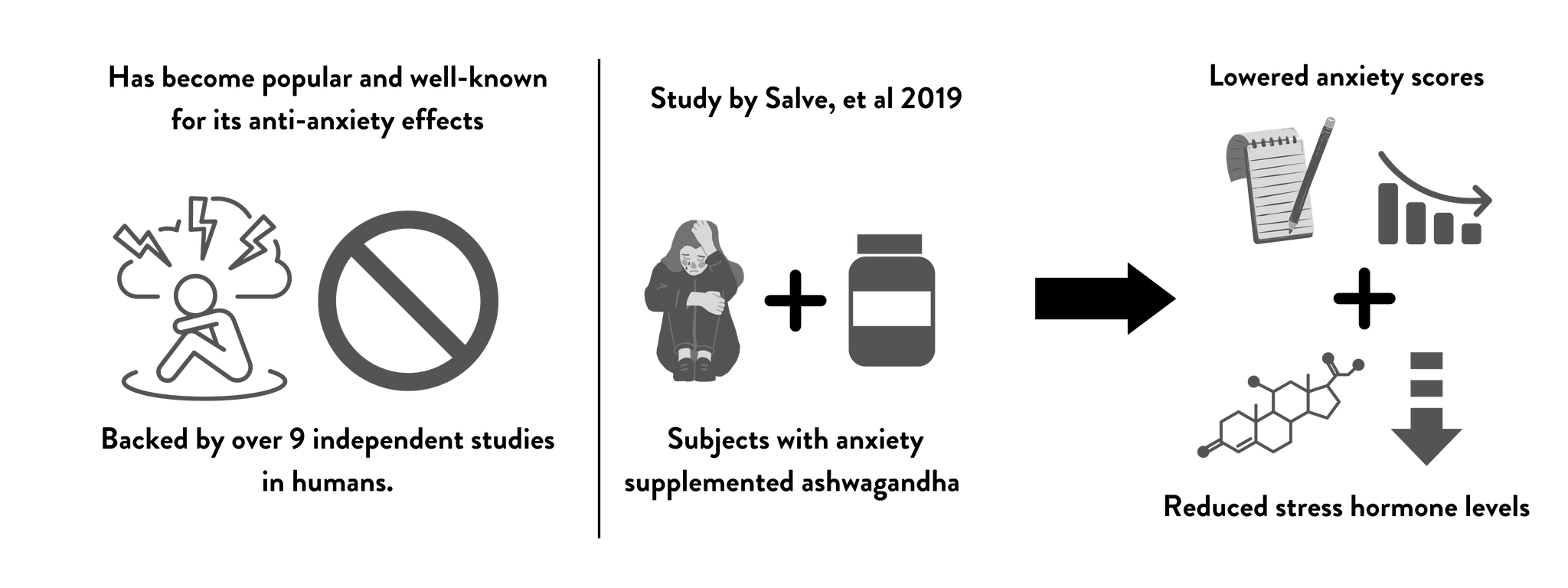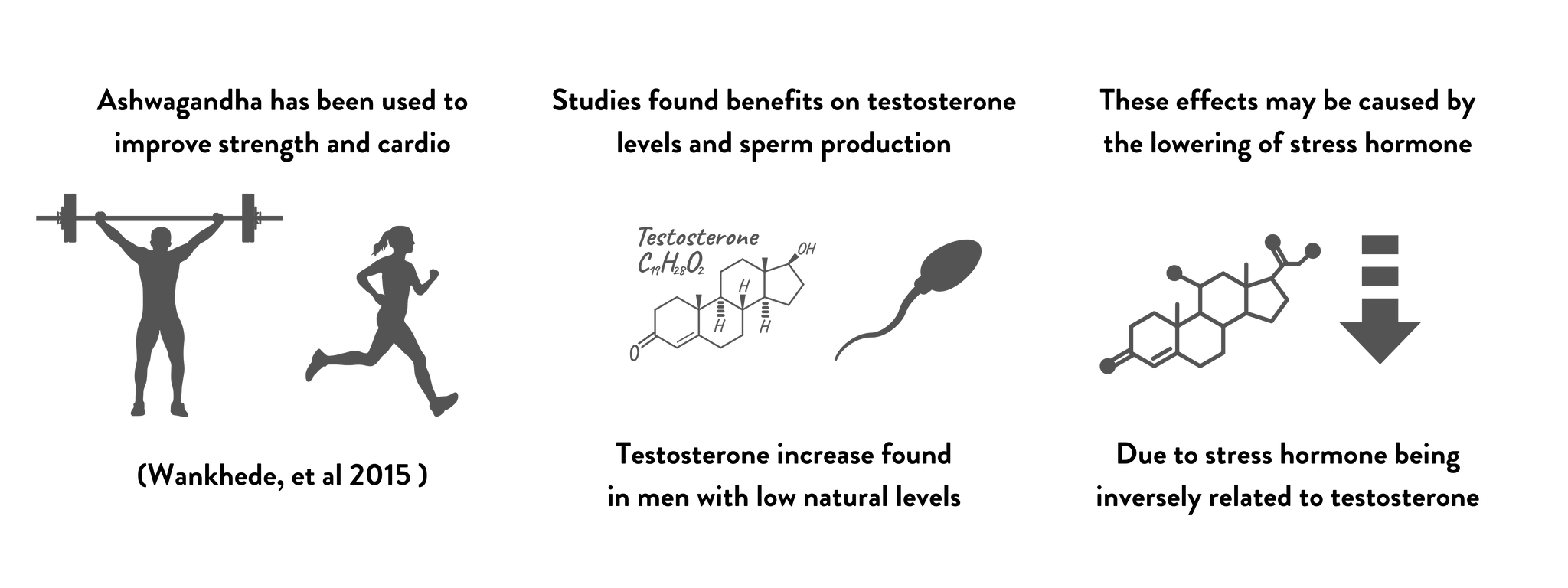
Ashwagandha (Withania somnifera) is a herb that has been used in Ayurveda, the traditional medicine of India for thousands of years. Its root has a horsey smell from which it was named, with ashva meaning horse and gandha meaning smell. It is also said traditionally to help confer the strength and virility of a horse. A number of studies suggest that ashwagandha has anxiolytic (anti-anxiety) effects and may also be able to help reduce insomnia, fatigue, and the symptoms of depression. Other studies found that It may increase power output in untrained subjects during resistance exercise and anaerobic running. Furthermore, research also saw that ashwagandha supplementation can lead to reductions in blood glucose and blood pressure, while optimizing healthy cholesterol ratios. Additionally, it may modestly increase testosterone and sperm quality in infertile men.

One of the most popular viewpoints on using ashwagandha is for its potent anxiolytic effects. This has been vigorously backed up by science with over 9 separate and independent studies in humans, all showing that ashwagandha can improve baseline stress and anxiety scores. These studies also saw that patients noted an improvement in fatigue, insomnia, and depressive symptoms, however these weren’t the primary aims and therefore were not statistically tested. One such study by Salve, et al 2019 directly tested anxiety and sleep using the Hamilton-Anxiety scale and Seven Point Sleep scale respectively. Baseline scores were taken prior to supplementation and then taken at the end of the study. Participants took either 250 mg or 600 mg of ashwagandha extract split into two doses daily. In both groups a significant improvall in anxiety and sleep scores was seen, with a P value of <0.05 and <0.001 for the 250 mg and 600 mg groups respectively. Serum cortisol levels were also tested, which is a physiological biomarker of stress, and both groups saw a statistically significant reduction in cortisol. Further studies found similar results in the reduction of stress, and improvement of sleep quality (Auddy, et al 2008:Chengappa, et al 2013:Chandrasekhar, et al 2012:Cooley, et al 2009).

Other than Ashwagandha’s anxiolytic effects, people have also been using it to help boost their testosterone levels, and improve both cardio and strength training. It is important to note that whilst ashwagandha may have some testosterone boosting abilities, this is only likely to occur in men with below normal levels, due to being impacted from an unhealthy lifestyle and stress. If you already have normal physiological levels it is unlikely to have an effect on your testosterone levels. Ashwagandha’s testosterone boosting abilities were first noted in studies looking at its effect on male sperm production. Ashwagandha has been seen to improve sperm quality with sperm concentration, overall volume, motility, and count all increasing in infertile males. It was also noted that testosterone and luteinizing hormone also increase in the group tested (Ahmad, et al 2010). In another study looking at power output in untrained individuals, the treatment group improved their 1 rep max bench press over the control group by 20 kg, which is a significant amount. The study also saw a statistically significant increase in muscle size, serum testosterone and muscle recovery (Wankhede, et al 2015). It has been hypothesized that ashwagandha’s testosterone and recovery boosting effect comes from its ability to reduce serum cortisol, which is inversely related to testosterone levels and recovery speed.
Chemically, the active compounds in Ashwagandha are steroidal alkaloids and lactones, collectively called withanolides (Elsakka, et al 1990). Not all compounds isolated have been associated with Ashawagandha’s biochemical activity, however, some notable compounds have. Withaferin A has been shown to be a inhibitor of angiogenesis, which is believed to be how it plays a role in protection against certain types of cancers (Mohan, et al 2004). While two glycowithanoloids (sitoindoside IX or sitoindoside X) have been indicated to be helpful in ashwagandha’s ability to reduce stress, whilst improving memory and learning in rats (Ghosal, et al 1989).
Purchase Here- Salve, J., Pate, S., Debnath, K., & Langade, D. (2019). Adaptogenic and Anxiolytic Effects of Ashwagandha Root Extract in Healthy Adults: A Double-blind, Randomized, Placebo-controlled Clinical Study. Cureus, 11(12), e6466. https://doi.org/10.7759/cureus.6466
- Auddy, B., Hazra, J., Mitra, A., Abedon, B.G., Ghosal, S., & Nagar, B. (2008). A Standardized Withania Somnifera Extract Significantly Reduces Stress-Related Parameters in Chronically Stressed Humans: A Double-Blind, Randomized, Placebo-Controlled Study.
- Chengappa, K. N., Bowie, C. R., Schlicht, P. J., Fleet, D., Brar, J. S., & Jindal, R. (2013). Randomized placebo-controlled adjunctive study of an extract of withania somnifera for cognitive dysfunction in bipolar disorder. The Journal of clinical psychiatry, 74(11), 1076–1083. https://doi.org/10.4088/JCP.13m08413
- Chandrasekhar, K., Kapoor, J., & Anishetty, S. (2012). A prospective, randomized double-blind, placebo-controlled study of safety and efficacy of a high-concentration full-spectrum extract of ashwagandha root in reducing stress and anxiety in adults. Indian journal of psychological medicine, 34(3), 255–262. https://doi.org/10.4103/0253-7176.106022
- Cooley, K., Szczurko, O., Perri, D., Mills, E. J., Bernhardt, B., Zhou, Q., & Seely, D. (2009). Naturopathic care for anxiety: a randomized controlled trial ISRCTN78958974. PloS one, 4(8), e6628. https://doi.org/10.1371/journal.pone.0006628
- Elsakka, M., Grigorescu, E., Stănescu, U., Stănescu, U., & Dorneanu, V. (1990). New data referring to chemistry of Withania somnifera species. Revista medico-chirurgicala a Societatii de Medici si Naturalisti din Iasi, 94(2), 385–387.
- Mohan, R., Hammers, H. J., Bargagna-Mohan, P., Zhan, X. H., Herbstritt, C. J., Ruiz, A., Zhang, L., Hanson, A. D., Conner, B. P., Rougas, J., & Pribluda, V. S. (2004). Withaferin A is a potent inhibitor of angiogenesis. Angiogenesis, 7(2), 115–122. https://doi.org/10.1007/s10456-004-1026-3
- Ghosal, J. Lal, R. Srivastava, S.K. Bhattacharya, S.N. Upadhyay. (1989). Immunomodulatory and CNS effects of sitoindosides IX and X two new glycowithanolides from Withania somnifera. Phytother Res, 3, pp. 201-206
- Ahmad, M. K., Mahdi, A. A., Shukla, K. K., Islam, N., Rajender, S., Madhukar, D., Shankhwar, S. N., & Ahmad, S. (2010). Withania somnifera improves semen quality by regulating reproductive hormone levels and oxidative stress in seminal plasma of infertile males. Fertility and sterility, 94(3), 989–996. https://doi.org/10.1016/j.fertnstert.2009.04.046
- Wankhede, S., Langade, D., Joshi, K., Sinha, S. R., & Bhattacharyya, S. (2015). Examining the effect of Withania somnifera supplementation on muscle strength and recovery: a randomized controlled trial. Journal of the International Society of Sports Nutrition, 12, 43. https://doi.org/10.1186/s12970-015-0104-9

